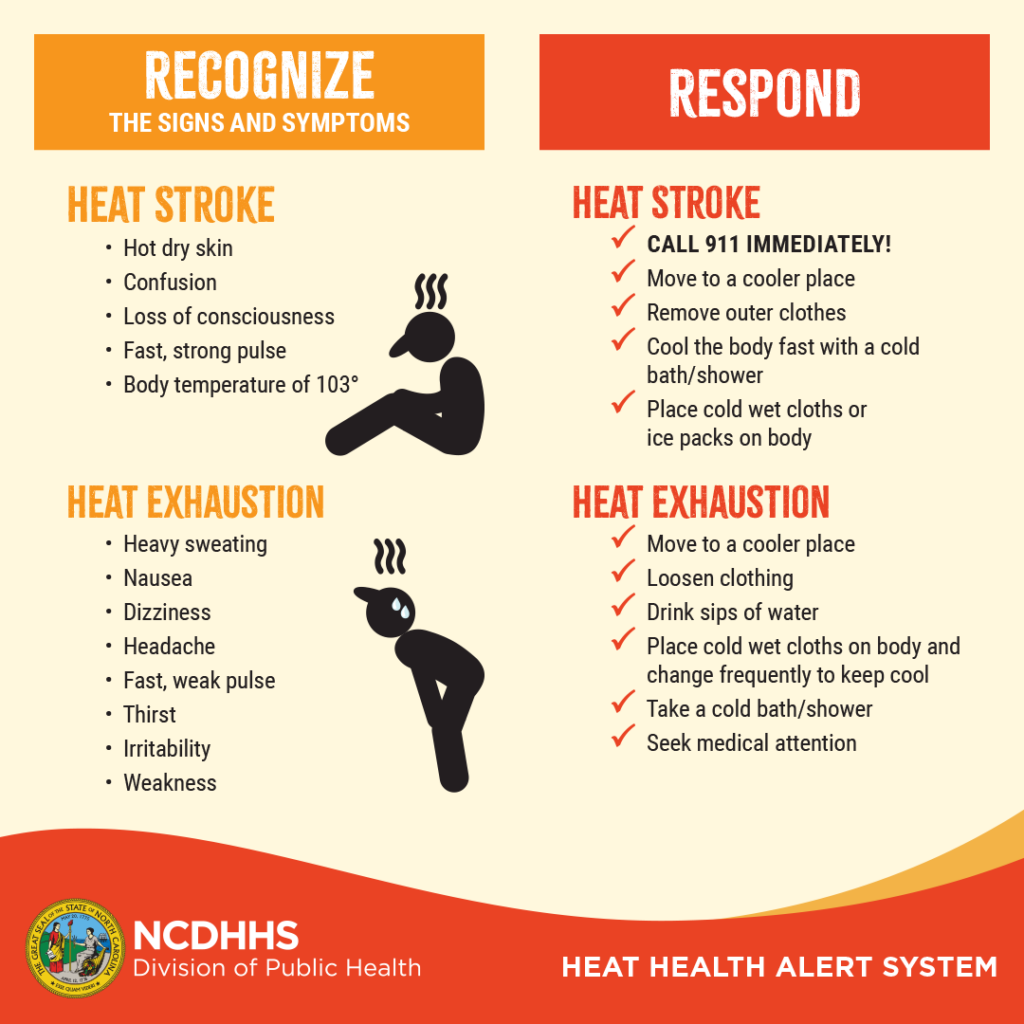Protecting Yourself From Heat-Related Illnesses While Working Outdoors
go.ncsu.edu/readext?1010028
en Español / em Português
El inglés es el idioma de control de esta página. En la medida en que haya algún conflicto entre la traducción al inglés y la traducción, el inglés prevalece.
Al hacer clic en el enlace de traducción se activa un servicio de traducción gratuito para convertir la página al español. Al igual que con cualquier traducción por Internet, la conversión no es sensible al contexto y puede que no traduzca el texto en su significado original. NC State Extension no garantiza la exactitud del texto traducido. Por favor, tenga en cuenta que algunas aplicaciones y/o servicios pueden no funcionar como se espera cuando se traducen.
Português
Inglês é o idioma de controle desta página. Na medida que haja algum conflito entre o texto original em Inglês e a tradução, o Inglês prevalece.
Ao clicar no link de tradução, um serviço gratuito de tradução será ativado para converter a página para o Português. Como em qualquer tradução pela internet, a conversão não é sensivel ao contexto e pode não ocorrer a tradução para o significado orginal. O serviço de Extensão da Carolina do Norte (NC State Extension) não garante a exatidão do texto traduzido. Por favor, observe que algumas funções ou serviços podem não funcionar como esperado após a tradução.
English
English is the controlling language of this page. To the extent there is any conflict between the English text and the translation, English controls.
Clicking on the translation link activates a free translation service to convert the page to Spanish. As with any Internet translation, the conversion is not context-sensitive and may not translate the text to its original meaning. NC State Extension does not guarantee the accuracy of the translated text. Please note that some applications and/or services may not function as expected when translated.
Collapse ▲As the summer heat intensifies in Sampson County, it’s essential for those working outdoors to be aware of the risks associated with prolonged exposure to high temperatures. Heat-related illnesses can range from mild heat exhaustion to life-threatening heat stroke. The N.C. Cooperative Extension, Sampson County Center is committed to ensuring the safety and well-being of our community, and we offer the following guidelines to help you stay safe while working outside.
Understanding Heat-Related Illnesses
- Heat Cramps:
These are painful muscle cramps, usually in the abdomen, arms, or legs, caused by heavy sweating and the loss of electrolytes. - Heat Exhaustion:
Symptoms include heavy sweating, weakness, cold, pale and clammy skin, a fast but weak pulse, nausea, vomiting, and fainting. It occurs when the body loses too much water and salt. - Heat Stroke:
This is a severe condition requiring immediate medical attention. Symptoms include a high body temperature (above 103°F), hot, red, dry or damp skin, a rapid and strong pulse, confusion, and unconsciousness.
Preventive Measures
- Stay Hydrated:
Drink plenty of fluids, especially water, throughout the day. Avoid beverages with caffeine, alcohol, or large amounts of sugar, as they can lead to dehydration. - Take Regular Breaks:
Rest in shaded or air-conditioned areas to give your body a chance to cool down. Schedule heavy work during the cooler parts of the day, such as early morning or late afternoon. - Wear Appropriate Clothing:
Lightweight, light-colored, and loose-fitting clothing helps to reflect heat and keep your body cooler. Don a wide-brimmed hat and sunglasses to protect your head and eyes. - Use Sunscreen:
Apply a broad-spectrum sunscreen with at least SPF 30 on all exposed skin to prevent sunburn, which can hinder the body’s ability to cool down. - Acclimate to the Heat:
Gradually increase the intensity and duration of your outdoor work over a week or two to build up your tolerance to the heat. - Be Aware of the Signs:
Educate yourself and your coworkers about the symptoms of heat-related illnesses and act promptly if someone shows signs of distress. Move them to a cooler location, offer water, and seek medical attention if necessary.
Emergency Response
If someone exhibits signs of heat stroke, such as a high body temperature, confusion, or unconsciousness, call 911 immediately. While waiting for medical assistance, try to cool the person rapidly by moving them to a shaded area, applying cool water to their skin, and fanning them to promote evaporation.
Community Resources
The Sampson County NC Extension Service offers resources on heat safety and other health-related topics. For more information, visit our website.
By taking these precautions, you can significantly reduce the risk of heat-related illnesses and ensure a safer working environment during the hot summer months. Stay safe and stay cool, Sampson County!




